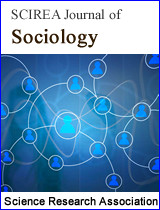Anthropocentric Naturism in The Broken Earth by Nora K. Jemisin
DOI: 10.54647/sociology840975 83 Downloads 14517 Views
Author(s)
Abstract
Anthropocentric naturism, mingling with sexism, dualism, colonialism, and other oppressive structures, is one of the obvious themes in the multigenre trilogy of The Broken Earth, written by American author, Nora k. Jemisin. Anthropocentric naturism is the instrumentalization of the earth, natural resources, and other species for anthropocentrist humans’ beneficial targets. The speculative science fantasy trilogy exposes the history of humans’ abuse of natural resources and the humans’ demise through natural calamities. Drawing on the studies of eco-social feminist theorizers, known as Val Plumwood, Greta Gaard, Susan Dubscha, and Juliet Ozanne, this article discloses the causes of eco-mishaps in the trilogy which reflects the real world and its non-stop eco-catastrophe. It foregrounds activation, logic, individuality, and integration of the earth with self-ecologist champions to support eco-human solidarity and cooperation of species and the more than-human-world for the renovation of the world.
Keywords
Anthropocentric Naturism, Abuse of Natural Resources, Colonialism, Dualism, Eco-social Feminist, Eco-human Solidarity
Cite this paper
Shohreh Haji Mola Hosein,
Anthropocentric Naturism in The Broken Earth by Nora K. Jemisin
, SCIREA Journal of Sociology.
Volume 7, Issue 1, February 2023 | PP. 38-58.
10.54647/sociology840975
References
| [ 1 ] | Atwood, Margaret. MaddAddam. NewYork: Random House, 2013. |
| [ 2 ] | Boyle, T. C. A Friend of the Earth. New York: Viking Books, 2000. |
| [ 3 ] | Brashness, Ann. The Here and Now. New York: Delacorte Press, 2014. |
| [ 4 ] | Browner, M. Carol. “Global Climate Change and Solutions”. Journal of Land Use & Environmental Law, vol. 13, no. 1, 1997, PP. 273-278. JSTOR, www.jstor.org/stable/42842704. |
| [ 5 ] | Buell, Lawrence. Writing for an End Angered World; Literature, Culture, and Environment in the U.S and Beyond. Massachusetts: the Belknap Press of Harvard University, 2001. |
| [ 6 ] | Butler, Octavia. Parable of the Sower. New York: Warner Books, 1993. |
| [ 7 ] | ---. The Xenogenesis Trilogy. New York: Time/ Warner Books, 2000. |
| [ 8 ] | Clark, Timothy. Ecocriticism on the Edge, the Anthropocene on the Threshold Concept. London: Bloomsbury Academic, 2015. |
| [ 9 ] | D’ Avanzo, Charlene. “Climate Fiction as Environmental Education”. Bulletin of the Ecological Society of America, vol. (99), no. (4), 2018, pp. 1-3, JSTORE, www. Jstor. org/stable/10.2307/26501940 |
| [ 10 ] | Dobscha, Susan and Juliet Ozanne. “An Ecofeminist Analysis of Environmentally Sensitive Women Using Qualitative Methodology: The Emancipatory Potential of an Ecological Life”. Journal of Public Policy and Marketing, vol. 20, no.2, 2001, PP.201-214. doi.org/10.1509/jppm.20.2.201. |
| [ 11 ] | Gaard, Greta. “Ecofeminism Revisited: Rejecting Essentialism and Re-placing Species in a Material Feminist Environmentalism”. Feminist Formations, vol.23, no.2, 2011, PP.2.doi.org/10.1353/ff.2011.0017. |
| [ 12 ] | Jemisin, K. Nora. The Fifth Season. E-book, Green Ronnin, 2015. |
| [ 13 ] | ---. The Obelisk Gate. E-book, Green Ronnin, 2016. |
| [ 14 ] | ---. The Stone Sky. E-book, Green Ronnin, 2017. |
| [ 15 ] | LeGuin, Ursula. Always Coming Home. New York: Harper & Row,1985. |
| [ 16 ] | ---. The Word for World is Forest. New York: Putnam Books, 1976. |
| [ 17 ] | Mallory, Chaone. “What is Ecofeminist Political Philosophy? Nature, Gender, and the Political”. Environmental Ethics, vol. 26. no. 1, 2013, PP. 17 1-189. doi.org/10.5840/enviroethics201032333 |
| [ 18 ] | McCarthy, Cormac. The Road. London: Picador, 2006. |
| [ 19 ] | Merchant, Carolyn. The Death of Nature: Women, Ecology, and the Scientific Revolution. San Francisco: Harper/ Row, 1980. |
| [ 20 ] | Miller, Jim. “Post- Apocalyptic Hoping: Octavia Butler’s Dystopian/Utopian Vision”. Science Fiction Studies, vol. 25, no. 2, 1998, PP. 336-360. JSTOR, www.jsto.org/stable/4240705. |
| [ 21 ] | Piercy, Marge. Woman on the Edge of Time. New York: Fawcett Books, 1985. |
| [ 22 ] | Plumwood, Val. Feminism and the Mastery of Nature. New York: Routledge, 1993. |
| [ 23 ] | ---. “Nature, Self, and Gender: Feminism, Environmental Philosophy, and the Critique of Rationalism”. Hypatia, Ecological Feminism, 6.1, Spring (1991): 3-27. JSTOR, www.jstor.org/stable/3810030. |
| [ 24 ] | Purser, E. Ronald, Changkil Park and Alfonso Montuori. “Limits to Anthropocentrism: Toward an Eco-centric Organization Paradigm”. The Academy of Management Review, 20. 4(1995):1053-1089. JSTOR,www.jstor.org/stable/258965. |
| [ 25 ] | Robinson, Kim, Stanley. Forty Signs of Rain. New York: Bantam, 2004. |
| [ 26 ] | ---. Fifty Degrees Below. New York: Bantam, 2005. |
| [ 27 ] | ---. Sixty Days and Counting. New York: Bantam, 2007. |
| [ 28 ] | Starhawk. The Fifth Sacred Thing. New York: Bantam Books, 1993. |
| [ 29 ] | Williams, Christopher. “Environmental Victimization and Violence”. Aggression and Violent Behavior, vol. (1), no. (3), 1996, PP. 191-204. Doi.org/10.1016/1359-1789(95)00015-1. |

